
Beware of excess during the holidays !
Beware of excess during the holidays !
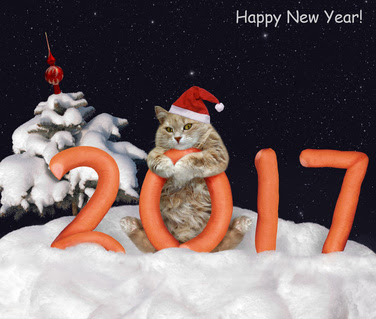
If you plan to invite your dog or cat at your table on Christmas Eve, Perhaps it is good to read these tips first…
Just as we, avoid, in the end of year meal, any excess to our pets.
At least, If you want to avoid spending the holidays with your vet ...
No chocolate !
Did you know that chocolate is very toxic to our pets ? Dogs and cats, Indeed, very sensitive to the effects of theobromine, a substance contained in the cocoa.
The degree of chocolate toxicity is a function of its cocoa content. Dark chocolate is so much more toxic than milk chocolate. The toxic dose is to bring the weight of your pet. A square of chocolate does not have the same effect in a new Earth and a chihuahua !
Depending on the amount ingested, Theobromine causes in dogs and cats, digestive symptoms, neurological disorders, heart problems, or death of the animal. A tablet 100 g dark chocolate can kill a dog under 10 kg ! Whatever it is, the golden rule is to never give chocolate to your pet !
No bones !
You are tempted to give the bone turkey or capon your dog or cat ? This is however strongly discouraged. The most dangerous bones are small sharp bones, like the bones of rabbit or chicken, that could perforate the gut. But the big beef bones are also banned ! The animal, by gnawing the bone, will promote the detachment of small splinters that can cause intestinal perforation. Apart from the risk of perforation, bones can, Furthermore, come completely obstruct the lumen and cause occlusion may be fatal.
Finally, the bones are often poorly digested and are responsible for digestive disorders such as vomiting and diarrhea. The best advice is to never give bones to your pets !
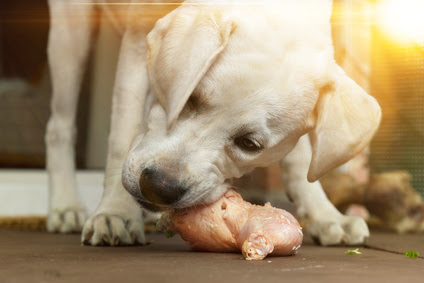
No unusual food !
Wanting to give a little "extra" to his pet for Christmas is natural but often results in the appearance of symptoms and a visit to the vet.
The power change without "food transition" causes digestive disorders, including diarrhea or vomiting, may persist for several days. So the most reasonable is to give your pet's regular diet !
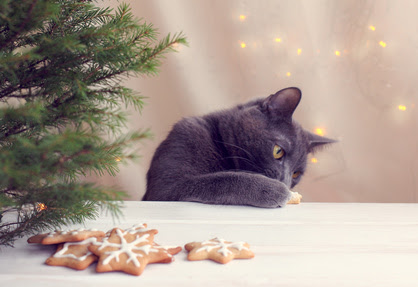
Beware of food too fat !
A diet high in fat is a risk factor for pancreatitis occurrence in cats as in dogs. This disease is an inflammation of the pancreas. The pancreas is an organ located next to the liver. It is connected to the stomach and the small intestine. His roles are :
a role in digestion : it secretes enzymes that are released into the digestive tract and involved in the digestion of food
endocrine role : by secretion of insulin and glucagon (involved in the regulation of glucose)
When inflammation of the pancreas, pancreatic enzymes is discharged directly into the abdominal cavity, which generates more or less pronounced symptoms as appropriate. In dogs, abdominal pain, an allowance and vomiting are often observed. But other disorders may be present such as respiratory problems, heart, coagulation disorders ... In cats, the symptoms are often much rougher and animal shows that sometimes depression and decreased appetite. Pancreatitis is a serious disease that can progress to a chronic or acute mode.
Furthermore, too fat diet increases the risk of hepatic lipidosis in the long term. This disease mainly concerns overweight cats. When overweight cat does not eat for a few days, peripherals fats are mobilized and come to massively accumulate in his liver that becomes "overloaded". The animal then present an abatement, digestive disorders, and often jaundice (jaundice). This disease is serious and can cause the animal's death.
so mistrust ! Avoid fat for your pet !
No alcohol !
Of course, you're not going to offer a glass of wine to your faithful companion, but some dogs and cats do not hesitate to use their own ! Sugary drinks such as beer, punch or sangria can be very appetizing to them ... A glass left abandoned on a corner table can make them happy ! So be vigilant and keep your glass in hand… Symptoms of alcohol poisoning can occur within 15 minutes 2 hours after absorption, depending on whether the animal is fasted or not. Prostration, somnolence, loss of equilibrium, paralysis, breathing difficulties, even coma are the common symptoms.
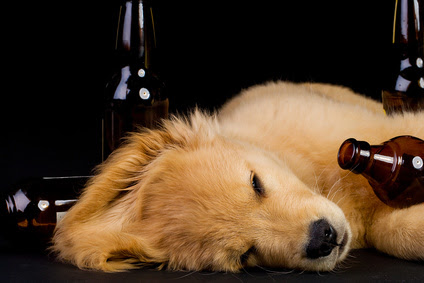
Forget the double rations ...
One might be tempted to say "go Kiki is Christmas, I give you twice as nuggets to please you ". Bad idea ... Why ? Because a food overload favors, There still, the occurrence of digestive disorders such as vomiting and diarrhea. It increases the risk for the animal to develop, as when excess fat, pancreatitis and, longer term, hepatic lipidosis. So let's be reasonable and give them a usual ration !
To compensate for this lack of overeating, you can give double dose of hugs to your faithful companion ... No risk of overdose or toxicity… It will be for him the best gift !
Merry Christmas to everyone !
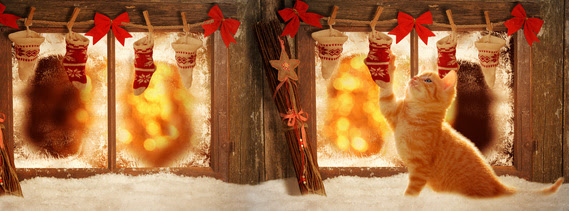
Author : Dr. Magali Pernot – Illustrator : Dr. Caroline Allard – Vetup®
